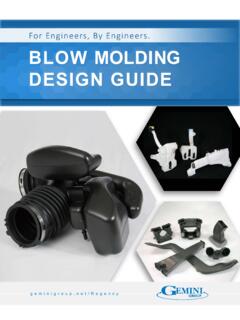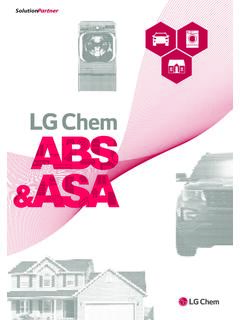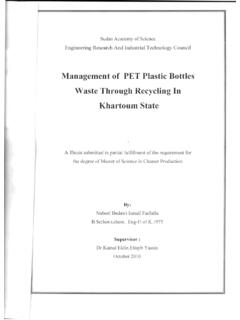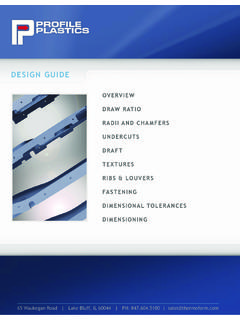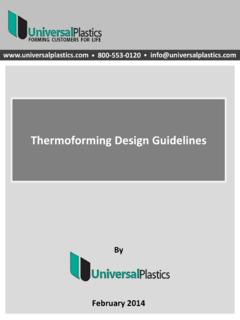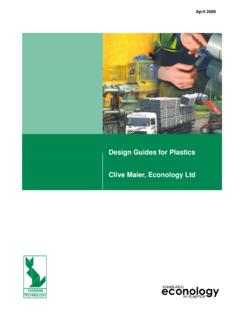Transcription of Specifications and Applications of Poly Lactic Acid (PLA ...
1 Specifications and Applications of poly Lactic Acid (PLA) Resin Product name : poly Lactic Acid (PLA) Resin Product description : poly Lactic Acid (PLA) is a thermoplastic resin derived from agricultural resources such as tapioca starch. PLA has properties equal to petro based plastics. PLA can be processed on conventional plastic machineries. PLA are available in different grades depending on the process thermoforming, injection molding , blown film, injection stretch blow molding (isbm), continuous yarn and fiber. PLA can be specially compounded for specific application. Non-GMO and Non Food Competition : PLA from tapioca starch, which is made from cassava roots, is non-GMO material. Tapioca starch is used mainly in textile and paper industries.
2 Therefore, it is not a food competition material. Environmental friendly : PLA being produced from agricultural resources is biobased and biodegradable by nature: After disposal of PLA in compostable environment, bacteria in soil will compost and consume the polymer of Lactic acid as nutrient. The remains are carbon dioxide , water and soil nutrients. Food safety : PLA meet requirements for use as food containers. It contains no heavy metals or substances harmful to health. PLA comply to food migration standards. Storage information : PLA should be stored in dry condition. Avoid high humidity,rain and/or damp area. Storage at normal room temperature is suitable. Avoid storing at temperature over 45C or sub zero . Avoid contact with chemicals or hazardous substances.
3 Safety and handling information : PLA is non-toxic. It can be handled as any normal material. Safety protection should be used when handling molten PLA. Fire and explosion hazards : PLA can burn just like any petro based plastics. All precautions used in handling petro based plastics are applicable to PLA. Waste disposal : PLA can be disposed in the same manner as petro based plastics. However, due to its biodegradability nature which is an environmental advantage, it s recommended to separate PLA from other plastics. The waste disposal of PLA is by composting method from which turn PLA into carbon dioxide, water and nutrients. Other informations : Please refer to Material Safety Data Sheet (MSDS) Grade : L100H GBP20 for thermoforming Applications : This is a general purpose grade for thermoforming process.
4 Among some Applications are : Food containers, one time servicewares, refreshment cups, agricultural seedling trays, transport trays, etc. It s possible to develop OEM compound for specific application. In such case, the technical Specifications may be different from the general purpose resin. Technical Specifications : Physical properties Unit Value Test method Appearance pellets mesh av. 35 seiving Density g/cm3 +/- .05 ASTM D792 Melt Index g/10 min, 190 kg 2-10 ASTM D1238 Melting point C 170-180 Glass transition temperature C 60-63 Mechanical properties Tensile strength MPa > 50 ASTM D882 Elongation at break 100 % > ASTM D882 Impact strength Kj/m2, Izod 3-5 Processing information PLA can be processed on petro based plastics extrusion machines.
5 Resins may require pre-drying before being extruded. Guideline for extruder settings are : Melt temperature 210 C Feed temperature 180 C Compression section 190 C Die temperature 190 C Screw speed 20-100 rpm Grade : L99L GBP30 for injection molding Applications : This is a general purpose grade for injection molding Applications . Among some of the Applications are cutleries, airline drink cups, telephone frames,furniture parts, automotive parts. It s possible to develop OEM compound for specific application. In such case, the technical Specifications may be different from the general purpose resin.
6 Technical Specifications : Physical properties Unit Value Test method Appearance-pellets mesh av. 35 seiving Density g/cm3 +/- ASTM D792 Melt Index g/10 min, 190 kg. 20-40 ASTM D1238 Melting temperature C 170-180 Glass transition temperature C 60-63 Mechanical properties Tensile strength MPa > 60 ASTM D638 Elongation at break 100 % > ASTM D638 Impact strength Kj/m2,Izod 3-5 Processing information : PLA can be processed on petro based plastics injection machines.
7 Resins may require pre-drying before injection molding operation. Guidelines for injection molding machine settings are : Melt temperature 200 C Feed temperature 165 C Compression section 195 C Nozzle 205 C Mold 25 C Screw speed 100-175 rpm Grade : L97H GBP40 for blown films, cast films Applications : This is the general purpose grade for film blowing and film casting. Among some Applications are : Bags, garbage bags, mulch films, seedling bags, labels, wrappers, etc. A special compound resin can be developed for Biaxially Oriented PLA (BOPLA).
8 BOPLA can replace BOPET or BOPP in Applications like candy wrappers, medicine pouches, flower wrappers, etc. BOPLA s biodegradability make it environmental friendly when disposed. Technical Specifications for BOPLA are different from general purpose resin. BOPLA films are printable and suitable for twist wrap. Technical Specifications : Physical properties Unit Value Test method Appearance pellets mesh av. 35 seiving Density g/cm3 +/- .05 ASTM D792 Melt index g/10 min,190 kg. 2-10 ASTM D1238 Melting temperature C 170-180 Glass transition temperature C 60-63 Mechanical properties Tensile strength MPa > 60 ASTM D882 Elongation at break 100 % > ASTM D882 Processing information : PLA can be processed on petro based plastics blown film and cast film machines.
9 Resins may require pre-drying before blown film operation. Guidelines for blown film machine settings : Melt temperature 210 C Feed temperature 180 C Compression section 190 C Nozzle 200 C Screw speed 20-100 rpm Grade : L98H GBP60 for continuous yarn and fabric. Applications : This grade is for general purpose continuous yarn making machine as well as spundbound and melt blow filament machines. Example of products are textiles, automotive seat covers, soft cushion fillings, non-woven fabrics. Technical Specifications : Physical properties Unit Value Test method Appearance pellets mesh av.
10 35 seiving Density g/cm3 +/- .05 ASTM D792 Melt index g/10 min,190 kg. 4-8 ASTM D1238 Melting temperature C 160-175 Glass transition temperature C 60-63 Mechanical properties Elongation at break 100 % > Processing information : PLA can be processed on machines used for extrusion spinning and drawing of petro based plastics. Resins pre-drying is necessary before extrusion spinning and drawing operation.
